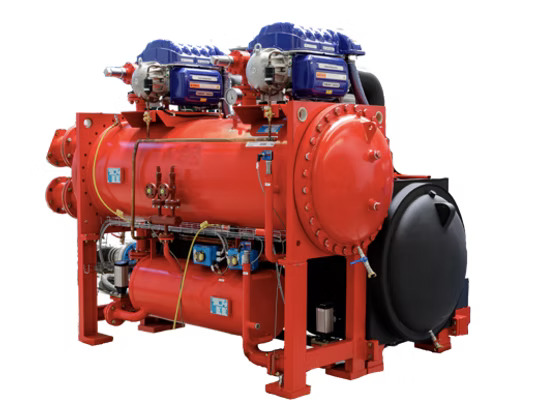Introduction
Quantum cooling chillers represent a cutting-edge advancement in temperature control technology, leveraging the principles of quantum mechanics to achieve unparalleled cooling performance. These chillers are designed to reach ultra-low temperatures with remarkable precision, making them indispensable in applications such as quantum computing, cryogenic research, and advanced manufacturing. By integrating innovative techniques like laser cooling, superfluidity, and magnetocaloric effects, quantum chillers not only enhance energy efficiency but also minimize environmental impact. As industries evolve to meet the demands of precision and sustainability, quantum cooling chillers are setting new benchmarks in cooling technology.
Unique Features and Advantages of Quantum Cooling Chillers
- Ultra-Low Temperature Capability
Quantum cooling chillers are designed to reach temperatures near absolute zero, enabling environments crucial for experiments in quantum mechanics, superconductivity, and low-temperature physics. These temperatures stabilize quantum particles, such as qubits in quantum computing, ensuring their delicate quantum states remain unperturbed by thermal noise. Such chillers surpass traditional refrigeration methods, making them indispensable in advanced research and emerging technologies. - Energy Efficiency
Traditional cooling methods consume substantial amounts of energy, especially in applications requiring extreme temperatures. Quantum cooling chillers, leveraging methods like laser cooling or magnetic refrigeration, operate with far greater energy efficiency. By reducing reliance on mechanical compression cycles and harnessing physical phenomena like Doppler shifts or entropy manipulation, these chillers cut energy consumption dramatically, lowering operational costs while achieving superior performance. - Precision Control
Maintaining consistent and precise temperature settings is crucial in industries like semiconductor manufacturing and optical systems. Quantum cooling chillers excel in delivering temperature stability with negligible fluctuations, often measured in microkelvins. This precision ensures optimal conditions for delicate processes, preventing defects in products like microchips or distortions in high-performance optical instruments. - Reduced Environmental Impact
Many quantum chillers use eco-friendly refrigerants or alternative cooling techniques that avoid greenhouse gas emissions. Techniques like magnetocaloric cooling eliminate the need for hydrofluorocarbons (HFCs), which are harmful to the environment. This makes quantum chillers not only efficient but also a sustainable choice for industries aiming to reduce their carbon footprint. - Compact Design
Quantum cooling systems often employ innovative designs that are compact and modular. Despite their advanced capabilities, these chillers occupy less space, making them suitable for confined environments such as research labs, medical facilities, and advanced manufacturing units. The reduced footprint enhances versatility and simplifies integration into existing systems.
Applications of Quantum Cooling Chillers
- Quantum Computing
Quantum computers require their qubits to operate in cryogenic conditions to prevent decoherence. Quantum cooling chillers provide the ultra-stable and low-temperature environment needed to maintain quantum states, enabling accurate and efficient computational processes. - Cryogenics and Research
These chillers play a pivotal role in experiments that demand cryogenic conditions, such as studying Bose-Einstein condensates, superconducting materials, or the behavior of particles at near-zero temperatures. Their reliability and precision enhance the scope and accuracy of such research. - Medical Imaging and Diagnostics
In medical imaging systems like MRI machines, maintaining consistent cryogenic temperatures is essential for superconducting magnets to function effectively. Quantum chillers improve image quality and reduce the risk of equipment overheating, enhancing diagnostic accuracy and patient safety. - Semiconductor Manufacturing
Processes such as photolithography, wafer etching, and deposition are highly sensitive to temperature variations. Quantum chillers ensure an ultra-stable thermal environment, minimizing defects in semiconductor devices and increasing overall yield and reliability in production lines. - Aerospace and Defense
Advanced aerospace systems and defense applications, such as infrared sensors, satellite instruments, and high-precision targeting systems, require stable and precise cooling solutions. Quantum chillers provide the reliability and performance needed in these mission-critical applications, ensuring optimal functionality even in extreme conditions. - Photonics and Optoelectronics
For photonics and optoelectronics applications, such as high-power lasers and optical sensors, maintaining consistent temperatures is essential to avoid performance degradation. Quantum chillers stabilize these components, ensuring high efficiency and prolonged operational life.
Conclusion
quantum cooling chillers are revolutionizing the way industries manage temperature-sensitive processes, offering unmatched precision, efficiency, and environmental benefits. Their applications span diverse fields, from stabilizing qubits in quantum computing to ensuring optimal performance in medical diagnostics and semiconductor manufacturing. As the world continues to push the boundaries of science and technology, quantum cooling chillers will play a pivotal role in enabling groundbreaking discoveries and innovations. Investing in this advanced technology is not just about meeting current cooling needs—it is about preparing for the future of high-tech industries.

